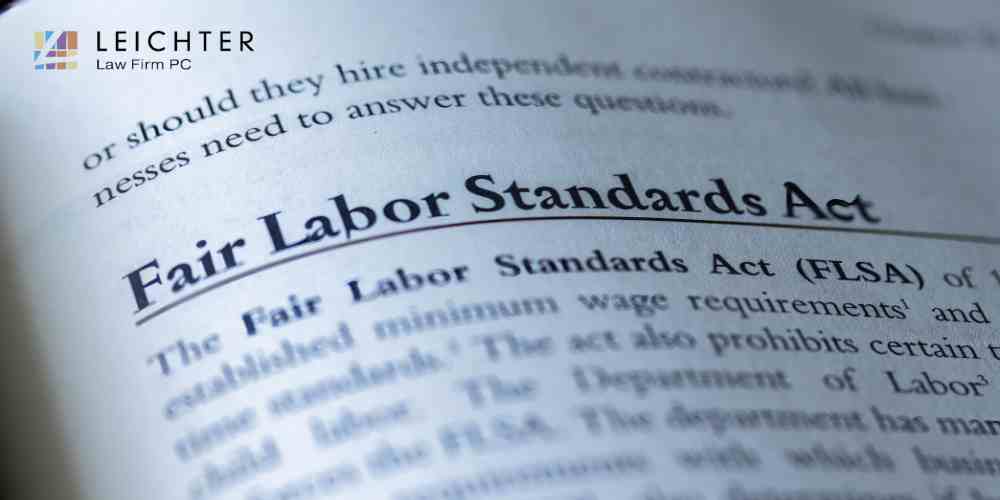Unpaid Overtime Attorneys New Braunfels, TX
Imagine returning home after a long day at work, tired but thankful for a weekend reprieve. You check your email for that much-anticipated message about your paycheck, opening it as soon as you can. Rather than confirming that you’ve been compensated for the exhausting overtime you put in, you find that your employer has shorted you. If this scenario hits a little too close to home, we encourage you to reach out to an unpaid overtime lawyer in New Braunfels as soon as possible.
At Leichter Law, our Texas employment lawyers are extremely skilled at representing workers who have been denied the overtime wages they earned. If your employer has violated federal labor and employment laws by failing to pay overtime, you may be eligible for an unpaid wage claim. We strongly believe in upholding and fighting for the rights of employees exploited by their employers, which is why we dedicate a large part of our practice to employment law.
If your employer refuses to pay the overtime you are legally entitled to, contact an attorney with Leichter Law. Schedule your free, no-obligation consultation by calling (512) 495-9995 today or submit an online intake form, and we’ll contact you.
What Is Unpaid Overtime?
Unpaid overtime is a payment that an employee earns by working overtime hours that their employer does not pay. It is a form of wage theft that is illegal under state and federal wage and hour laws. Labor laws are clear when it comes to unpaid wages – employers must pay their employees for all the hours they work at the correct rate of pay.

Let’s look at an example of a case of unpaid overtime. Sarah works as a marketing manager at a small advertising agency. She is classified as an exempt employee and is paid a fixed salary of $45,000 per year. Her employment contract specifies that she is expected to work 40 hours per week, but she often ends up working significantly more hours to meet tight deadlines and client demands.
She hasn’t received any additional compensation for these extra hours because her employer considers her an exempt employee and, therefore, not entitled to overtime pay. However, Sarah primarily performs non-exempt job duties, meaning she may have been misclassified as an exempt employee. In this case, she may have a valid unpaid wages claim.
What Occupations Are Not Entitled to Overtime Pay in Texas?
Under federal or state law, most employees are entitled to overtime pay. It is more likely than not that an employer must pay employees overtime compensation. When a nonexempt employee works more than 40 hours in a workweek, they are owed overtime at a rate of 1.5 times their normal rate.
Below, we outline the differences between exempt and nonexempt employees.
Exempt vs. Non-Exempt Employees
Under federal law, exempt and nonexempt employees are similar in most respects except when it comes to overtime pay. If an employee is exempt under the FLSA, they are not entitled to overtime pay. For an employee to be classified as exempt, they must perform job duties such as the following.
Office work, exercising your judgment about business matters, with a weekly pay rate of at least $684.
Computer programming, software engineering, or similar roles with responsibilities such as systems analysis techniques, computer systems tasks, and programs tasks. The position must not involve manual labor and must earn at least $684 a week, or no less than $27.63 per hour.
Business control, hiring and firing other employees, and making other important business decisions, with a weekly rate of at least $684.
Regularly working outside your place of business, making sales, and getting contracts.
Accounting, engineering, architecture, teaching, and creative roles such as writing, art, music, and other professions with a salary of at least $684 per week.
Remember that earning a salary does not automatically exempt you from earning overtime pay. If an employee performs no exempt duties, even while being paid a salary, they are still entitled to overtime wages.
What Are the Federal Overtime Laws?
The Fair Labor Standards Act (FLSA) is perhaps the most important federal law when it comes to protecting fair working conditions for employees, establishing a federal minimum wage, establishing overtime pay, and more. Enacted in 1938, the FLSA is administered and enforced by the U.S. Department of Labor (DOL).
Fair Labor Standards Act (FLSA)
Some of the most important labor, wage, and hour regulations set forth by the FLSA include the following.
The FLSA sets a federal minimum wage that employers must pay to covered nonexempt employees. The minimum wage may be periodically adjusted by Congress to reflect changes in the cost of living.
Nonexempt employees are entitled to receive overtime pay under the FLSA. Overtime is at a rate of “time and a half,” meaning 1.5 times the regular pay rate. A nonexempt employee must be paid overtime for all hours worked beyond 40 in a workweek.
The FLSA includes regulations that restrict the types of work and hours that minors (individuals under 18 years old) can perform in the workplace to ensure their safety and well-being.
Employers covered by the FLSA are required to maintain accurate records of employees’ hours worked and wages earned. This helps ensure compliance with minimum wage and overtime provisions.
The FLSA provides exemptions from certain minimum wage and overtime pay requirements for specific categories of employees, such as executive, administrative, and professional employees, who meet certain criteria, including job duties and salary level.
What Are My Rights Under the FLSA?
If your employer violates overtime or minimum wage laws, the FLSA includes provisions under which you can file a lawsuit for unpaid wages. FLSA violations are very serious, therefore incurring serious penalties. Employers who engage in overtime or minimum wage violations often must pay double the amount of unpaid wages to the plaintiff. They may also be required to pay attorneys’ fees and court costs.Can My Employer Fire Me for an Unpaid Overtime Claim?

No. If you sue your employer for unpaid wages owed to you, it is illegal for that employer to fire you, retaliate against you, or discriminate against you in response. If you are the victim of employer retaliation when they fail to properly pay wages for your hours worked, you may have an additional retaliation claim.
What Are Common Ways Employers Violate Overtime Laws?
Unfortunately, it is all too common for employers to violate state and federal laws regarding overtime compensation. They will often vehemently deny any unpaid wage claims and even make up stories to avoid properly paying their employees. Some of the most common tactics used by employers in unpaid overtime cases include the following.
Some employers explicitly require work off the clock from their employees, while others expect off-the-clock work to keep up with deadlines. However, employees who work more than 40 hours a week, regardless of whether that falls within their normal working hours, are entitled to overtime compensation.
Some employers average hours over more than one pay period to avoid paying overtime. For example, an employee works 35 hours one week, then 45 hours the next. An employer cannot legally average those hours over two weeks to avoid paying 5 hours of overtime.
Compensatory time is the option to use one’s overtime in exchange for time off later. Comp time is only legal in the public sector, so employees who are being compensated this way for their overtime may have an unpaid wages claim.
Many employers intentionally fail to pay overtime, but claim ignorance when confronted about it later. When this happens, there is usually ample evidence to disprove their claims.
Some employers attempt to use their employees’ non-citizen statuses to avoid paying overtime. However, all nonexempt employees, regardless of legal status, are entitled to overtime.
Which Types of Workers Are Often Denied Overtime Pay?
It is possible for any nonexempt employee to experience unpaid overtime. However, certain employees are exploited more often than others. Wage theft is an unfortunately common experience for the following types of employees.
Hourly Employees
Many hourly employees and tipped workers, such as those in the service industry, are required to perform off the clock work before and after their shift. When this happens, employers must compensate for that time appropriately.
Salaried Employees
Remember that, just because an employee is salaried, this does not mean they are exempt from overtime pay. Many employers use this misconception to their advantage when trying to deny overtime. If you are unsure of your status as an exempt or nonexempt employee, we recommend speaking with an underpaid overtime attorney as soon as possible.
Independent Contractors
An employer may try to avoid paying overtime by making you an independent contractor. However, being an independent contractor does not automatically make you an exempt employee. To find out if you are still eligible for overtime, contact our employment law firm today.
Janitorial Workers
Despite the crucial roles they play in our daily lives, janitorial workers are often the victims of unpaid wages. It is illegal for employers to withhold overtime from nonexempt janitorial employees.
Day-Rate Workers
Some workers are paid a day rate, meaning they are paid per day instead of per hour or on a salary basis. Some employers think that day-rate employees are not entitled to overtime, but this is not always the case. Many day-rate workers have unpaid wages their employer owes them but refuses to pay.
Call Center Workers
Call centers have become increasingly common in recent years as the telemarketing industry has grown significantly. Many call center employees work long hours, frequently exceeding 40 hours in a workweek to meet quotas. If a nonexempt call center employee works more than 40 hours, they are usually entitled to overtime pay.
How Can I Sue for Unpaid Overtime in New Braunfels, TX?
If you have been denied the overtime pay you earned, you may be able to file a claim under federal and state laws. These laws are often complex, and your employer will likely try everything they can to avoid paying what you are owed. We strongly recommend seeking help from a qualified wage and hour lawyer before pursuing legal action. The attorneys at Leichter Law are standing by to offer a free consultation about your case.

How Much Unpaid Overtime Can I Recover?
In a successful unpaid overtime lawsuit, you can not only recover the lost wages you were originally owed, but you can also recover liquidated damages. Liquidated damages are compensation for the delay in receiving the original payment. You may even be able to collect attorney fees and court costs from your employer. To get a better idea of the worth of your case, contact Leichter Law today.
Why Should I Choose Leichter Law?
Leichter Law is a premier employment law firm with extensive experience in unpaid wage claims. We provide unparalleled legal counsel for those whose employers have attempted to cheat them out of their hard-earned wages. When you work with our team, you gain the advantage of working with a board-certified labor and employment law specialist.
Only a small percentage of Texas attorneys hold this title, so you can rest assured that you’re in good hands with Leichter Law. We can help you show your employer that they won’t get away with committing wage and hour violations against you.
Contact a New Braunfels Unpaid Wages Lawyer at Leichter Law
If you have been the victim of unpaid overtime, contact the Leichter Law Firm as soon as possible. A Texas unpaid overtime attorney with our firm will help you take legal action against your employer and fight to ensure you are properly paid for the hours you worked. To learn more about your legal options, please call our office at (512) 495-9995 and schedule a free case review.
Get in Touch
Office Locations
1602 E 7th St
Austin, TX 78702
Phone: (512) 495-9995
Get Directions
3700 N Main St
Houston, TX 77009
Phone: (713) 714-2446
Get Directions
214 N 16th St #128
McAllen, TX 78501
Phone: (956) 205-0884
Get Directions
- Unpaid Overtime Lawyer Cibolo, TX
- Unpaid Overtime Lawyer Converse, TX
- Unpaid Overtime Lawyer McAllen, TX
- Unpaid Overtime Lawyer New Braunfels, TX
- Unpaid Overtime Lawyer San Antonio, TX
- Unpaid Overtime Lawyer San Marcos, TX
- Unpaid Overtime Lawyer Schertz, TX
- Unpaid Overtime Lawyer Seguin, TX
- Unpaid Overtime Lawyer Timberwood Park, TX
- Unpaid Overtime Lawyer Cibolo, TX
- Unpaid Overtime Lawyer Converse, TX
- Unpaid Overtime Lawyer McAllen, TX
- Unpaid Overtime Lawyer New Braunfels, TX
- Unpaid Overtime Lawyer San Antonio, TX
- Unpaid Overtime Lawyer San Marcos, TX
- Unpaid Overtime Lawyer Schertz, TX
- Unpaid Overtime Lawyer Seguin, TX
- Unpaid Overtime Lawyer Timberwood Park, TX

